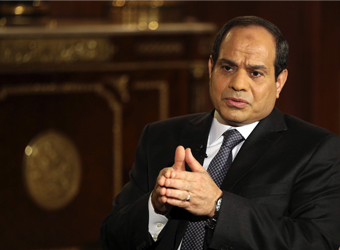Egyptian President Abdel Fattah al-Sisi said on Sunday that the state is “in a race against time” to provide citizens with essential consumer goods at affordable prices, citing difficulties due to increasing rates of consumption.
The president made the comments during an event in Qena to inaugurate a set of infrastructure development projects in Upper Egypt.
In his speech, Sisi referred to a range of measures linked to economic reforms that are intended to fix problems in the economy and bring consumer prices under control, while ensuring that the supply of goods keeps pace with demand.
He said that the economic reform programme, which was launched in 2014, is necessary to ensure the Egyptian currency settles at its true value relative to the nation’s economy.
Among the key reforms introduced was the floatation of the pound in November 2016, a move that he said was essential to improving the economy.
“The state used to subsidize the value of the Egyptian pound and that was a very dangerous economic situation that got us into a lot of trouble,” the president said.
When the fiscal reforms, including fuel subsidy cuts and a range of new taxes, were introduced, they were described as necessary to ease a growing budget deficit. However, they resulted in price increases, hitting the nation’s poor particularly hard.
Sisi said on Sunday that ordinary citizens should be provided with a full set of figures on the economy, allowing them to keep abreast of developments.
However, he said that consumer prices, which have risen significantly in recent months, are still cheaper than in most countries around the world, adding that “the building of nations is not an easy process; there are burdens that citizens must bear.”
Sisi also addressed the challenges facing the nation in the area of agriculture and food security, since problems with supply have contributed to rising food prices.
“We produce between 8 and 10 million tonnes of grain and import another 10 million, while we consume a total of 18 tonnes annually. Here we are not talking about an increase in demand due to the increase in population, but we are basically talking about a steep increase in our consumption,” he said.
Last week, the planning ministry announced that Egypt aims to increase its silo storage capacity to 3.13 million tonnes of wheat in 2017/18 from 1.528 million tonnes in 2015/16.
Egypt, the world’s top importer of grain, has been implementing policies to limit the use of private-sector silos and increase its own capacity to curb smuggling and fraud in the local market.
“That’s why it is very important to hold such meetings, to make all the information on the situation available to the Egyptian citizen”, Sisi said, addressing government officials in Qena.
The Egyptian president also thanked the United Arab Emirates for financing many development projects in the country, including the project for wheat silos.
However, he expressed frustration at delays in the ongoing process of repossessing state land that has been appropriated illegally by private parties over the last few decades, urging the interior ministry and the armed forces to put an end to such transgressions.
“This is not some abandoned farm property, it’s the state’s land, and we will not allow anybody to put his hands on one inch of it illegally,” Sisi said.
In 2016, Sisi formed a national committee to redeem stolen state land in accordance with the law governing each authority.
The committee announced last December that it had restored 80,000 feddans of land illegally acquired at the expense of the state.
The committee is headed by Egypt’s former prime minister Ibrahim Mahlab and includes the minister of local development, the president’s aide for security affairs and counter-terrorism, and representatives from the justice, defense and finance ministries, as well as Egypt’s general intelligence.
Source: Ahram online


